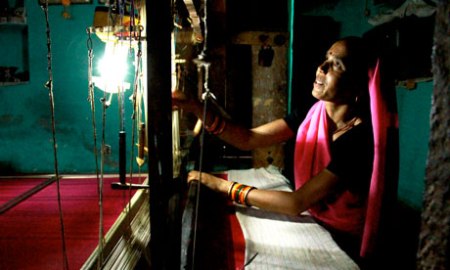There are currently around 1.3 billion people, approximately 20% of the world’s population, that lack access to electricity. Most of these people live in poverty and rely extensively on biomass and fossil fuels for heating and lighting. The United Nations has set a Millennium Development Goal to achieve universal electricity access by 2030. While this is a hopeful goal, it is certainly within reach. [1]
Electricity is tied with wealth and quality of life. Impoverished countries that lack electricity access must rely heavily on subsidized fossil fuels in order to heat and light their homes. Also, the poorest countries in the world typically import most or all of their fossil fuels. According to one study done by The Worldwatch Institute, “ of the 47 poorest countries, 38 are net importers of oil, and 25 import all of their oil.” [2]
This heavy dependence on fossil fuels creates a strain on the economy of both the governments and the people in these countries. Governments must constantly be wary of unstable oil prices, and money that could be better spent on education or healthcare must go into these subsidies in order to provide a consistent low price for the people. Many different policy measures have been tried to help this system, but according to the IEA, “Only 8% of the subsidies to fossil-fuel consumption in 2010 reached the poorest 20% of the population.” [3] This dependency is a vicious cycle: one that could be broken by introducing renewable energy.
Renewables provide several benefits for people in poverty. For one, new jobs would be created inside the countries installing and maintaining the systems. By bringing the energy sector within countries, governments will no longer be reliant on imports and will be able to redirect funds into social programs that will better benefit the poor. Renewables such as solar panels could be easily implemented in rural areas without the need to invest in expansive transmission lines. Essentially, renewables could easily bring electricity to impoverished people in a very short amount of time. Businesses could thrive by being able to stay open longer, and children could spend more time studying rather than collecting fuel to cook with. [4]
An Indian woman’s lighted home from solar powered LEDs [5]
[1] -http://www.forbes.com/sites/mahaatal/2012/09/26/sustainable-energy-for-all-how-to-fight-poverty-and-climate-change/
[2] –http://www.worldwatch.org/brain/media/pdf/pubs/ren21/ren21-1.pdf
[3] – http://www.worldenergyoutlook.org/media/weowebsite/2011/executive_summary.pdf
[4] – http://www.sarpn.org/genderenergy/resources/cecelski/energypovertygender.pdf
[5] – http://www.guardian.co.uk/global-development/poverty-matters/2013/mar/06/india-solar-electricity


Renewable energy sources will definitely pave the way for making electricity available wide spread in the future. I am curious as to what the UN goal for the provision of electricity to those 1.3 billion people means, does it mean consuming like the average energy consumption per capita of the world (75 Quads) or that of the USA (350 Quad) or does it mean lesser than both? I think the current goal should be to get electricity to improve their lifestyles with basic things that will make a difference, such as a light bulb, fan, etc. These little little things make all the difference in developing countries. The bigger picture should obviously be the full fledged use of electricity such as in the industrialized nations and cities. Constant research and investments need to be made in the renewable energy sector in order for this goal to become a reality. Secondly, the 38 poor countries that import oil, any idea how much of that oil goes towards electricity? I believe oil is mainly used for transportation, and countries (specially the poor ones) resort to coal to mainly produce their electricity provided they have the resources.